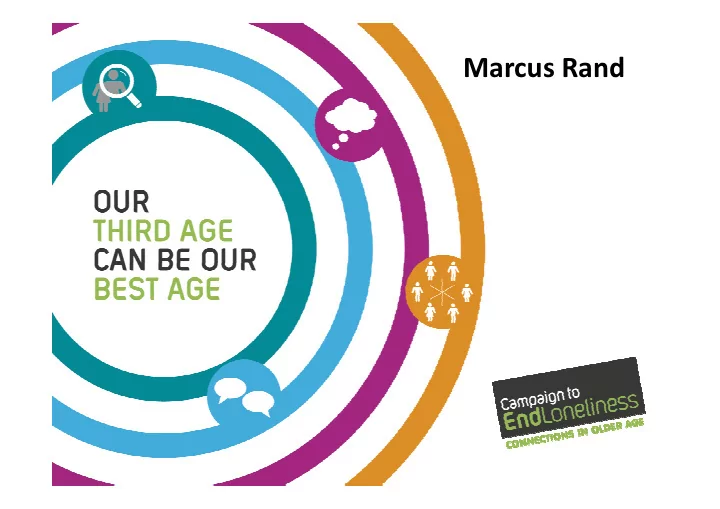

Marcus Rand
The Campaign to End Loneliness … • Five years old this year • Campaigning body to promote a major shift in thinking about loneliness • Drive increased awareness of loneliness as a major health and economic problem • Campaign for positive policies and plans on the ground • Promote sharing of knowledge and best practice • Over 1000 organisations in our learning and research network
Lil’s Story – loneliness from a urban perspective
DEFINING LONELINESS LONELINESS: ISOLATION: IS SUBJECTIVE IS OBJECTIVE the unwelcome feeling of a measure of the a gap between the social number of contacts or connections we want and interactions the ones we have It can be “Language... has created the word ‘loneliness; to express the pain of • Social or emotional being alone. And it has created • Transient, situational the word ‘solitude’ to express the or chronic glory of being alone.” Paul Johannes Tillich
LONELINESS IN THE UK of the population aged 10% 65+ over 65 are often or always lonely 1/2 17% Of all older people of older people are (over 5 million) say in contact with television is their friends, family and main company neighbours less than once a week,
RISK FACTORS FOR LONELINESS Risk factors converge and increase, and our resilience may reduce, as we age
LONELINESS HARMS PHYSICAL HEATH Loneliness: � Poses an equivalent risk for early death as smoking 15 cigarettes a day � Increases the risk of high blood pressure � Increases risk of cardiovascular disease � Increases risk of dementia Lonely people are: � More likely to smoke and drink alcohol � More likely to be overweight and have poor diets � More likely to skip medication
LONELINESS HARMS MENTAL HEATH Loneliness: Is linked to development of depression � Can delay recovery time from illness � Correlated with self-reported poor health and � psychological distress Can predict suicidal behaviours in older age �
COSTLY TO HEATH AND SOCIAL CARE What we know: � Preventing and alleviating loneliness helps older people to remain more independent � 76% GPs report 1-5 patients a day come to their surgery because they are lonely � The cost of being chronically lonely to the public sector on average is around £12,000 per person based on costs associated with GP and A&E visits � Research in Cornwall and Devon found a third of patients admitted to A&E had very infrequent meaningful social interactions– less than once a month, or never
COSTLY TO HEATH AND SOCIAL CARE Reducing loneliness can boost independence and reduce costs by resulting in: � Fewer GP visits � Lower use of medication � Fewer days in hospital � Improved ability to cope after returning from hospital � Reduced inappropriate admission to care homes � Increased contribution of older people to society: sharing skills, knowledge and experience
ADDRESSING LONELINESS Foundation Direct Gateway Structural Services Interventions Services Enablers Reach Support existing Transport Community relationships Understand Technology Volunteering Help make new Support connections Positive ageing Change thinking
FOUNDATION SERVICES These are services that: Reach lonely individuals • Understand and respond to the specific • circumstances of an individual’s loneliness Support individuals to take up the services that • would help them make meaningful connections
FOUNDATION SERVICES: REACH 1) Use data to target action (using risk factors to map risk of loneliness by neighbourhood) 2) Eyes and feet on the ground - agent based referral schemes - agency based referral schemes 3) Forming partnerships with multiple organisations and professionals across the community is essential. Create one referral form to support your reach: “So private care agencies, water companies, we’ve got fire and rescue, health services, absolutely everybody can get their hands on those forms. It’s about lots of people knowing about it and it’s about drip, drip, drip, continually reminding people that you’re there and what you can do.”
Foundation Services: Further practical FOUNDATION SERVICES methods for reaching lonely older people PRACTICAL WAYS TO IDENTIFY THE MOST LONELY 1. Community resource directories 2. Social prescribing 3. Bereavement 4. Coproducing community 5. Technology 6. Libraries
FOUNDATION SERVICES: UNDERSTAND & RESPOND Specific needs must be understood to ensure interventions are personalised and appropriate � Guided conversation Specific issues might be around: � Stigma � Accessibility - sight/hearing loss - mobility issues � Confidence and willingness to engage
Case Study – Halton Wellbeing Services
Find out more www.campaigntoendloneliness.org 020 7012 1409 info@campaigntoendloneliness.org.uk @EndLonelinessUK
Recommend
More recommend